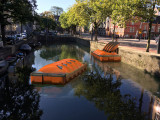Stay in the know on all smart updates of your favorite topics.
Mobility and transport are crucial for a city to function properly. Amsterdam is considered the world capital of cycling; 32% of traffic movement in Amsterdam is by bike and 63% of its inhabitants use their bike on daily basis. The number of registered electrical car owners in the Netherlands increased with 53% to 28.889 in 2016. Since 2008 car sharing increased with 376%. However, this is less than 1% of the total car use. Innovative ideas and concepts can help to improve the city’s accessibility, so share your ideas and concepts here.
Smart Mobility Platform
HERE Mobility is dedicated to driving smart mobility forward through high-tech solutions. With a sophisticated suite of products, HERE Mobility empowers customers and enables the businesses that cater to their needs. By standardizing and opening up access to all mobility services, connecting supply with demand, HERE Mobility is democratizing the mobility ecosystem to benefit all businesses and consumers.
The mobility ecosystem is hyper-fragmented, with obstacles hindering true freedom of movement. HERE Mobility aims to improve access to the world’s transportation and mobility services by bringing them all into one place.
Our team will be visiting Amsterdam on January the 7th till the 9th, get in touch to hear more on the mobility revolution.
Coworking Smart City
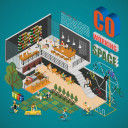
This year is the 10th anniversary of my decision to devote myself to the creation of the models of social changes. After banging my head against the wall, trying to scale the default coworking business model, I realized that only city-wide catalyst models such as smart city can survive and are ones of the pillars of the future of coworking business as well as cities itself.
It took some time when I tried to persuade the atomized community of small coworking owners that our model will not sustain and will probably end up very, very soon, but they didn’t want to listen. Next year, the network of publicly financed spaces turned up into business, disrupting the co-working space in every major city.
It was 2011, but of course, it was yet not what is coming now, when the main international networks are opening a multitude of huge spaces in the capital cities, using deep pockets of VC bankers and property managers and owners.
Warm, organic community growth generated by its leaders — it’s time to say goodbye. The future is in large corporate global coworking behemots.
Well, I foresighted that too. But in fact, the problem of coworking and the growth of these amazing communities (in Poland) lay somewhere else, than a lot of people think, and I hope I’m right on this. Poland is brain-drained, and the number of freelancers and creatives on the market is not growing, but even decreasing!
The problem can stand like this: how to encourage the average tee drinking person (from outside of creative industries) to fill all of the new transformed places? In other words: how to make people learn and become creative for the purpose of office rental to grow?
Introducing serious gaming can be one of the solutions. In Poland, we developed a complex model of how to get secondary schools and technical schools’ students on board of smart city and into the creative industry but it’s for another story.
In some cities, the important issue is how to not rent buildings to corporate employees, but how to use the growing number of freelancers, digital nomads and creative industries to fill new floors in new, sophisticated buildings and even neighborhoods.
We need to rethink that on a big scale. What you do not see in the small business sheet, is what large operators see. And they are making the impact right now.
The revolution will soon come over how the city is treated, used and perceived. For more and more people, city spaces become a meeting platform where they share time for creative activities with other people. As a reminder, for most of us, city streets are still the means of the fastest transfer between work and home and visiting many strange offices in order to get along with life in the so-called society. But this era is going to the end according to Toffler theory of The Third Wave. (and many others).
Reality changes quickly and aims to transform most experiences according to new paradigms and new reality. When we talk, new technologies “eat” workplaces and administrative bodies one by one. The new reality is about convergence, experience, sensitivity to all activities related to science and useful society or urban activities.
Step by step, engaging people in new social models such as coworking, as well as smart city, we as frontier innovators introduce expectations to a whole new level for the citizens. And imagine how competitive the city will be, after being completely reorganized to facilitate the coworking culture in its all places and spaces. The new intelligent digital layer of the social city will finally emanate in different forms.
The most important coworking values: community, cooperation, openness can be a great foundation for building other smart city solutions on it.
At this point, I really want to encourage the coworking and startup community to cooperate with municipal offices to facilitate and promote new socio-economic models, such as cooperation platforms, sharing economy and social entrepreneurship.
Why it’s so important?
In July 2011, Mitsui Fudosan announced its new concept, Kashiwa-no-ha Smart City, based on three pillars: environment symbiosis, health and longevity, and creation of new industry.
Gate Square, which serves as the center of the smart city and brings together offices, residences, retail space, a hotel, and academic facilities, encourages interaction among the residents of the area, as well as those who commute to the city to work. (@Mitsui Fudosan Co., Ltd. )
The city’s perspective offers access to all taxpayers, and all this means that communication takes place in all urban social groups. At the same time, there is no way for city administration by themselves to adapt to the new disruptive innovation in enough fast pace because of the development opportunities have always will be stalled in administrative and budgetary never-ending processes.
The line of cooperation between city halls and coworking and startups must be marked. If they all have an impact, cities can grow well and live fully. But what exactly is a smart city? it is about citizens in all aspects of their lives and development using the latest technological advances, as well as methods for integrating and empowering people to take the driver seat in cities.
So what concerned me and what I’m talking about in the Smart City Podcast is that if, in fact, startups offering services to their citizens are often placed in coworking. So I assumed what the future role of this community for the city might be of great importance. Recognizing the positive effect of gathering creative people in post-industrial districts in order to revitalize it gives me hope that the urban strategy will eventually include a systematic approach to support and benefits for local communities.
But it is not what always happens. In most cases the positive effect of this coalition is consumed by private business not the city itself.
There is still a clash between the old-fashioned archaic hierarchy and the partial approach to city management, and new grassroots impulses. The new urbanists concepts are about driving development through the combination of ideas, products that enable the crowd’s wisdom in creating the city. So-called smart city 3.0 approach. But what cannot be combined in an old paradigm with only an improvement called sometimes “creative” or “smart” can be combined into a completely new model of an intelligent city, and ultimately it will replace those catching up and still converting cities.
What is to come is, of course, standardized as a framework for programming applications for “i-stores” and “app markets” for city creators and visionaries. It is not possible to maintain the basic needs of citizens’ tools based on a certain form of capitalist/market-oriented intermediary operating from the sky and oceans. Everything will be brought to local clouds and as close as it can be to the community of people adopting these independent standards, these standards will be introduced at the EU level or at the global level.
The re-orientation of the use of common communication / technology platforms and the emergence of new interfaces will also be achieved thanks to new data transfer standards (such 5G) and a fundamental change of the current system’s pillars, such as financial transactions (Fintech), as well as fluid law enforcement and liquidity through blockchain, as well as distributed and reliable databases.
Imagine what will happen if all applications are just a larger complex system that will allow cities to do just better. And I do not want to issue a label — or a brand for it (if I may i’ll name it City2.0neOS) Certainly the aggregation and the process of setting standards for cities can be a process that will end with a completely new ecosystem for innovation and unveiling our living to the fullest, and this is what it is all about.
SpaceOS is a smart technology, creating smart buildings and smart offices by letting workspaces turn the physical spaces into digital assets.
So in my opinion, a new model of cities based on a foundation of Open Source idea (Github and Linux are the greater examples) will be created. It will be standing on the values that create a coworking movement, and this model will be a combination of well-known solutions and applications in a standardized interurban form that will be developed by the community for its own purposes and best interests. And what’s best this movement is vibrant and alive and it’s happening all over the world. I hope in my best will that in the best solution and it is unstoppable and impossible to reverse.
Write to me if you want to learn more about the idea of a coworking city!
Nieuwe mobiliteitsoplossingen vereisen slimme ICT
De komende jaren zal het Nederlandse wagenpark ingrijpend veranderen. Het percentage elektrische voertuigen is momenteel weliswaar nog zeer klein, maar zal naar verwachting de komende jaren sterk gaan groeien. Dat gaat zonder twijfel leiden tot forse problemen in het elektriciteitsnetwerk van ons land. Er is daarom veel nieuwe kennis en veel slimme ICT nodig om de smart mobility-oplossingen waaraan nu wordt gewerkt straks ook daadwerkelijk mogelijk te maken.
Nog afgezien van de vraag of het grid wel in staat zal zijn om te gaan met de snelle groei van elektriciteit opgewekt door windmolens en zonnepanelen, gaat de vraag naar elektrische energie ook nog eens drastisch veranderen. Het moment waarop met name zonne-energie kan worden opgewekt sluit namelijk niet aan op de tijdstippen waarop de vraag naar elektrische energie wel eens zou kunnen gaan pieken. Elektrische auto’s zullen immers vooral ‘s avonds worden opgeladen, terwijl overdag de meeste zonne-energie wordt opgewekt. Daarom wordt in het kader van het Europese EV-Energy project gekeken naar technieken en tools waarmee deze mismatch kan worden voorkomen of kan worden bijgestuurd.
Lees meer:
FABULOS
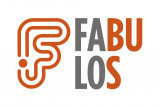
FABULOS (Future Automated Bus Urban Level Operation System) is a European research and development project to establish and deliver a systemic proof-of-concept for automated last mile public transport as part of the existing transport system of urban areas, based on the use of self-driving minibuses. The FABULOS project has received funding from the European Union’s Horizon 2020 research and innovation programme and runs from 1 January 2018 until 31 December 2020. The FABULOS project has partners in Estonia, Finland, Greece, the Netherlands, Norway and Portugal. The six procuring partners use Pre-Commercial Procurement as a tool to co-create an innovative solution together with multiple companies. Contracts have been signed in December 2018 with 5 consortia. The first Phase (feasibility study) starts in January 2019. Actual piloting of fleets of robot buses takes place in all 6 partner cities from Spring 2002 onwards.
Most recent press release: https://fabulos.eu/five-consortia-awarded-contracts-in-fabulos-pre-commercial-procurement/
The FABULOS consortium has finalised the evaluation of the tenders in December 2018 and has awarded five consortia with contracts. The aim of these contracts is to facilitate procurement of R&D work to develop systems capable of operating fleets of automated minibuses. As a first step towards this goal, each consortium will conduct a feasibility study of proposed solutions and technologies.
After the closing of the FABULOS request for tenders on 31 October 2018, the tenders were assessed by the Technical Evaluation Committee. In addition to commercial feasibility and project management, nine functional criteria and three non-functional criteria were used. The functional criteria range from fleet management and remote operation and all the way to requirements for vehicle capabilities in mixed traffic. Societal and legal aspects form elements of the non-functional criteria. The fleet is expected to drive in mixed traffic, at urban speeds, in nearly in all weather conditions and without a conductor on board.
“We were positively surprised by the high quality of tenders received and were pleased to discover so many exceptional solutions to the FABULOS challenge. It will be very exciting to see these proposed solutions become a reality by the end of 2020,” summarises Technical Chair of the Evaluation Committee Oscar Nissin, from Metropolia University of Applied Sciences.
Five European consortia have succeeded in the first stage of the competition. In total, 16 companies from six European countries formed consortia as follows:
- The FVF Consortium consisting of three Finnish partners: Fortum Power and Heat Oy, Fleetonomy.ai Oy and VTT Technical Research Centre of Finland.
- The Kompai-Actia Consortium consisting of two French companies: Kompaï Robotics and Actia Automobile.
- The Mobile Civitatem Consortium consisting of four partners from Estonia: Modern Mobility Oü, Tallinn University of Technology, Silberauto Eesti AS and Ecofleet Eesti Oü. The fifth member of the consortium is the Danish company Autonomous Mobility A/S.
- The Saga Consortium consisting of four Norwegian partners: Halogen AS, Forus PRT AS, Spare Labs Inc. and Ramboll Management Consulting AS.
- The Sensible 4 – Shotl Consortium consisting of two partners: Sensible 4 from Finland and Shotl from Spain.
The total FABULOS procurement budget is around 5,500,000 euros (incl. VAT). The maximum budget for individual suppliers involved in all three phases is over 1,000,000 euros (incl. VAT).
Future of Mobility Hackathon in Riga Letland georganiseerd door de Nederlandse Ambassade

In 2018 had de Nederlandse Ambassade in Riga (LV) de eer om het staatsbezoek van Zijne Majesteit de Koning Willem-Alexander aan Letland te organiseren. Als vervolg op het staatsbezoek organiseert de Nederlandse Ambassade in Letland een hackathon getiteld: “The Future of Mobility – Get Connected! Smart Mobility and Sustainable Logistics” op 19-21 februari 2019 in Riga. Het evenement zal de economische relatie tussen Nederland en Letland bevorderen en kansen bieden voor innovatie, alsook de startups aantrekken van de sectoren transport, logistiek en mobiliteit.
Gedurende 48 uur zal 100 tal deelnemers (in teams bestaande uit minimaal 3 en maximaal 5 personen) uit het bedrijfsleven en de publieke sector aan duurzame en innovatieve oplossingen werken. De vier thema’s zijn Altertnative Mobility, Navigation and Innovative Use of Traffic Data, Smart Urban Logistics, Mobility as a Service. Ze zullen dit doen aan de hand van Nederlandse en Letse challenges, gebruikmakend van databases uit beide landen. Onze partners voor dit evenement zijn hackathon orhanisatoren Garage48 en de Letse grootste telecommunicatiebedrijf Latvijas Mobilais Telefons (LMT). De hackathon zal plaatsvinden in het hoofdkwartier van LMT. Tegelijktijdig vindt het drukbezochte regionale start up tech evenement TechChill plaats, en de winnaars zullen de prijzen op het TechChill-podium in ontvangst nemen.
Als organisator is de ambassade op zoek naar bedrijven die geïnteresseerd zijn in sponsoring en participatie. Het sponsoren van dit evenement biedt uw bedrijf de uitgelezen kans om met experts uit beide landen te werken aan innovatieve en vooruitstrevende oplossingen op het gebied van Smart Mobility en Sustainable Logistics. Als sponsor kunt u bovendien eigen challenge aandragen gerelateerd aan de hoofd thema’s. De ambassade verwelkomt Nederlandse deelnemers uit zowel het bedrijfsleven, start-ups, de academische wereld en de publieke sector. Deelname aan het evenement is gratis voor Nederlandse deelnemers (u ontvangt een 100% kortingscode).
Voor meer informatie kunt u terecht bij Indra Freiberga, de Senior Economic Officer. @: indra.freiberga@minbuza.nl
T: 00371 29434242
Informatie: https://www.facebook.com/events/309420533243833
Aanmelden via: https://www.eventbrite.com/e/garage48-future-of-mobility-tickets-53135503722
Living Mobility
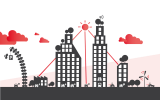
Gebiedsontwikkeling en mobiliteit in één congres. Een dag vol inspiratie, met een krachtige line up van meer dan 50 (inter)nationale sprekers, voorbeelden uit binnen- en buitenland, workshops, panels, debatten en inspiratie. En vooral ook elkaar ontmoeten! Vastgoed en mobiliteit komen niet allen samen op het podium, maar ontmoeten elkaar ook in de zaal.
De opgave: steden laten groeien: hoe doen we dat duurzaam en met behoud van mobiliteit voor inwoners?
Tijdens het congres Living Mobility, georganiseerd door Ananda Groag i.s.m. Rebel Group en Pakhuis de Zwijger zetten we onze tanden in dé opgave voor Nederland voor het komende decennium: er voor zorgen dat de steden kunnen groeien, we de Parijse duurzaamheidsdoelstellingen halen én mensen zich kunnen blijven verplaatsen. Een behoorlijke uitdaging. Maar nodig. Want er komen steeds meer mensen in de steden bij en het wordt daardoor te vol: dringen in het OV, de wegen slibben dicht en de huizenmarkt zit op slot. De vergrijzing zorgt daarbij voor een veranderende samenstelling van de bevolking, met andere behoeften aan huisvesting en mobiliteit.
Om de bevolkingsgroei in de grote steden aan te kunnen, moeten er voor 2030 één miljoen nieuwe woningen bijkomen. Ter illustratie; dat is grofweg twee keer het huidig aantal woningen in Amsterdam. Mobiliteit speelt een belangrijke rol in deze opgave en simpelweg uitbreiden van spoor en weg is niet langer voldoende effectief en efficiënt. Heel praktisch: zonder slimmer gebruik van bestaande mogelijkheden, zonder nieuwe oplossingen, of mobiliteitsconcepten, kunnen al die woningen niet eens worden gerealiseerd en blijven de klimaatdoelen buiten bereik. Er is een andere manier van plannen nodig. Gebiedsontwikkeling biedt bij uitstek de ruimte om met een frisse blik naar de toekomst te kijken, integraal, innovatief en inclusief.
Living Mobility is een congres waarbij mobiliteit en gebiedsontwikkeling met elkaar verbonden worden en dat op lokaal, landelijk én internationaal niveau inspiratie én concrete handvatten biedt (stedenbouwkundig, verkeerskundig, bekostiging, besluitvormend). Bouwen en bewegen; mobiliteit, niet als onderwerp op zichzelf, maar als pijler van een gezonde stad en geoliede stad. Een congres waarbij we gaan verkennen hoe mobiliteit in de toekomst onderdeel wordt van wonen. Van visie tot praktische aanpak in de ontwikkeling én initiatie van totaalconcepten, van organisatie tot de exploitatie en implementatie. Doe en denk mee op 16 april 2019 in Pakhuis de Zwijger, Amsterdam.
Free MOOC on Sustainable Urban Freight Transport
Life in the city relies on the smooth operation of urban freight transport. But, we know there are a lot of issues associated with the activity, leading to often very unsustainable outcomes. If you're interested in sustainable transport, don't neglect looking at urban freight!
We have a free course on Sustainable Urban Freight Transport starting next week 4th December 2018. It is a collaboration between top universities around the world, and led by TU Delft. It provides you with a clear introduction to the world of city logistics. Hopefully, it will spark some innovation in thinking about integrating older practices with smart city initiatives and startups.
If you're interested, enroll at https://www.edx.org/course/sustainable-urban-freight-transport-a-global-perspective.
Share this with your friends and colleagues. Enroll together and it will be more fun!
Looking forward to seeing you there!
Smart Mobility in de MRA: gewoon doen!
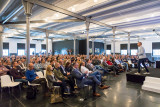
Met smart mobility oplossingen maken we mobiliteit binnen de Metropoolregio Amsterdam slimmer, duurzaam en toekomstbestendig. Maar hoe ziet de regio er over twintig of dertig jaar uit? Tijdens de tweejaarlijkse kennisbijeenkomst Smart Mobility in de MRA op 1 november jl. kwamen alle betrokken partners en marktpartijen bij elkaar voor de laatste update over lopende projecten.
Innovatieve last mile
Op station Zaandam stonden elektrische steps en scooters, deelauto’s en deelfietsen opgesteld. Deelnemers van het congres konden deze unieke services gebruiken voor de last mile van station naar evenementenlocatie Taets. Dé ideale manier om kennis te maken met elektrische steps van Enino, groene scooters van Felyx, deelauto’s van Stap Inn, innovatief OV van Via Van en deelfietsen van FlickBike. Na een woord van wethouder Gerard Slegers werd tijdens de opening van het congres de diensten van FlickBike ook in de gemeente Zaanstad gelanceerd.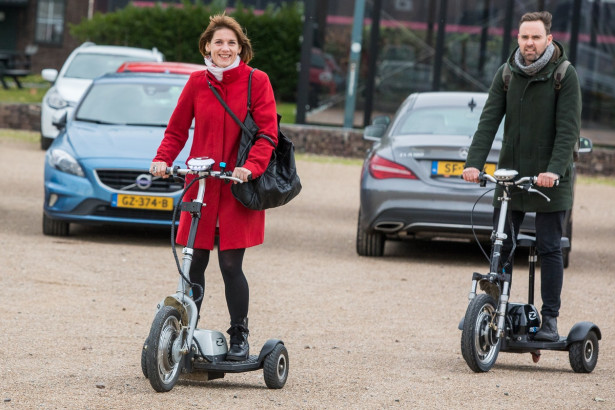
Projectenoverzicht
Naast kennisdelen en ontmoeten stond ook de Smart Mobility projectenkaart centraal met daarop alle lopende projecten in de MRA. Dit is de eerste keer dat er een overall overzicht gepresenteerd is met daarop alle actuele projecten. Het overzicht is tijdens de dag verder aangevuld met projecten die er nog niet op stonden. Het resultaat zie je hier. Wil je op de hoogte blijven van het projectenoverzicht? Stuur dan een mail naar smartmobility[@]vervoerregio.nl.
Kennis delen in workshops
De kennisbijeenkomst stond deze keer in het teken van de toekomstbestendigheid rondom smart mobility. Na twee inspirerende, soms uitdagende key-notes van trendwatcher Richard van Hooijdonk en directeur Thijs Emondts van Uber werd er binnen verschillende workshops en speeddates gesproken over projecten en initiatieven in de regio. Zo namen Derk Wantia (MOJO Concerts) en Arwind Gajadien (LiveCrowd) de aanwezigen mee in de afwegingen voor een soepel verkeer rondom festivals en zocht Bart van Arem (TU Delft) naar input voor een wetenschappelijk vervolgonderzoek naar zelfrijdend vervoer in de MRA.
Speeddaten: alles wat je weten wilde over...
Uniek aan het evenement was de mogelijkheid om te speeddaten. Onder het motto ‘alles wat je altijd wilde weten over…’ konden deelnemers in korte tijd alles te weten komen over onder andere Talking Traffic of de slimme energieopslag in de Johan Cruijff ArenA. Een laagdrempelige manier om te discussieren, netwerken en geinspireerd de deur uit te lopen.
Op de hoogte blijven
De presentaties van de workshops en foto’s van de dag vind je op www.smartmobilitycongres.nl.
Wil je op de hoogte blijven van Smart Mobility in de MRA? Neem dan contact op via smartmobility[@]vervoerregio.nl.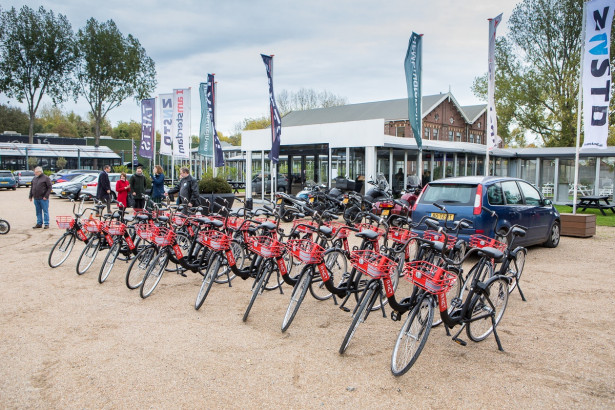
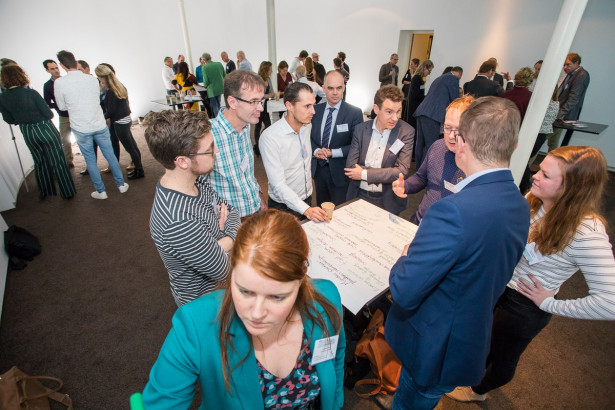
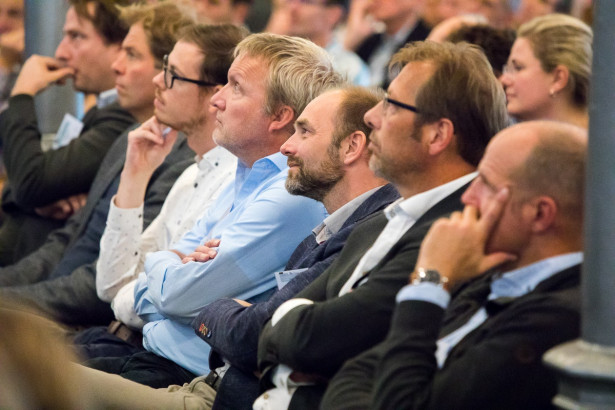
SDG Meetup | Industry, Innovation & Infrastructure

The Sustainable Development Goals (SDGs) Meetups are an accessible platform to learn about and work on the SDGs in an entrepreneurial way, facilitating collaboration and exchanging knowledge. It is an opportunity to meet social entrepreneurs, SMEs, independent professionals and established organisations working toward the same goal.
In this month's Meetup will be focusing on SDG 9: Industry, Innovation & Infrastructure. Investment in infrastructure and innovation are crucial drivers of economic growth and development. That’s why SDG 9 encourages building resilient infrastructure, promoting inclusive and sustainable industrialization and fostering innovation.
CONTRIBUTORS
➜ Metabolic | Andrew McCue, Sustainability Consultant | Metabolic is a consulting and venture building company that uses systems thinking to tackle global sustainability challenges. By sharing their knowledge and tools, they help businesses, governments and non-profits thrive in the circular economy. They’re also behind iconic projects like developing Amsterdam’s first circular neighbourhood, Buiksloterham, and supporting DGTL Festival’s transition to a zero-waste strategy. #KnowledgeSharing
➜ Studio Wae | Tynke van den Heuvel, Founder | After trying - and failing - to find an adjustable carpet on Pinterest, Tynke came up with her business idea for a circular carpet brand. Studio Wae produces decorative tiles and carpets for outdoor and indoor spaces, made from waste streams! Tynke will share more about her circular products, how she extracts materials for production using urban mining, and the partnerships she developed in the process. #Action
➜ Biopolus | Kriszti Árvai-Nagy, Dutch Partnership Executive | Biopolus is a Hungary-based water innovator. Using advanced biological engineering, they’ve created a modular, expandable water treatment system for complex circular urban water treatment and management. Kriszti will tell us more about their BioMakery approach, specifically focusing on the Koningshoeven BioMakery: their first water treatment facility in the Netherlands, for which they won the water management category of the 2019 Dutch Circular Awards. #Action
➜ You! | The event will continue with an interactive process facilitated by Thomas van der Molen, founder of Sustainable Start. Together, we’ll brainstorm about various issues relating to SDG 9 to generate new insights for overcoming such challenges, and aim to find new ways to accelerate sustainable solutions for Industry, Innovation and Infrastructure.
PROGRAM
19:00 Entrance (grab a drink)
19:30 - 21:30 Event (learn-innovate-participate)
21:30 - 22:00 Networking Drinks
22:00 End
PRICE
Regular ticket: €9,50 – Includes a free drink
Impact Hub member ticket: Free
SDG House resident ticket: Free
MORE ABOUT SDG MEETUP
Sustainable Development Goals Meetup is a monthly meetup powered by SDG House Residents Impact Hub Amsterdam and C-Change. Each edition focuses on one selected SDG (i.e. gender equality, climate change). It is an evening event with participatory nature to generate new learning, connections, collaborations and action! At each event we invite knowledge partners, entrepreneurs, innovators and expert facilitators to co-create this inspiring environment for us.
WHERE?
The meetups takes place at Impact Hub Amsterdam located in the SDG House (KIT Royal Tropical Institute) in Amsterdam Oost. SDG House, as a community, houses over 1000+ professionals and 50+ organisations working on or with the SDGs.
Symposium It's all electric

Werk jij aan de transitie naar een elektrisch wagenpark of bent je geïnteresseerd? Natuur & Milieu organiseert het symposium It’s all electric voor bedrijven en overheden. Ontdek in één dag hoe het koplopers gelukt is hun wagenpark te verduurzamen en hoe je gemeenten kunt betrekken bij de transitie van jouw bedrijf. Je krijgt voorbeelden uit de praktijk en met de Routekaart die wij presenteren handvatten om zelf de juiste stappen te maken.
Onderwerpen:
- Van ambitie naar transitie
- Wat is er te koop?
- Slimme laadoplossingen
- Zero emissie stadslogistiek
Voor wie: fleet– en sustainability managers van bedrijven met een wagenpark, overheden en marktpartijen die bezig zijn met de transitie naar een elektrisch wagenpark en geïnteresseerd zijn in de mogelijkheden, best practices en laatste ontwikkelingen op dit vlak.
AI Is Getting Bike-Sharing On The Right Track In Smart Cities
Bike-Sharing system or bicycle-sharing system has been around since 1965 when a group called Provo introduced it in the bicycle-loving Amsterdam. But the idea of bike-sharing created a buzz only after the entry of smart city concept. It began to be recognised as an effective tool to reduce air pollution, traffic congestion, travel costs, and fossil fuel-dependency while improving public health. Besides, making cities look much more vibrant, cool and cosmopolitan.
However, launching a bike-sharing system in cities and over time making it an appealing mode of transportation is no easy feat. It requires a significant private and public investment and alterations to the built environment while understanding the needs of citizens. Many bike-sharing programs have been initiated amidst much hype yet their popularity has soon declined. They have ended up being used mainly on weekends and for recreation purpose.
There are a number of factors that lead to the failure of a bike-sharing system. But according to reports, the most impactful factors that discourage people from opting for it are dockless systems or systems that do not have adequate docks in a city. Dockless systems increase the risk of theft and vandalism while insufficient docking points make it difficult for riders to park the bike at a given dock and hence reducing the proper redistribution of bikes. If this single issue is resolved, bike-sharing programs can easily meet success and become an irresistible transport option in smart cities.
Amsterdam tests autonomous boats
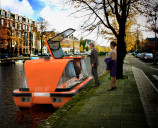
Small-scale autonomous boat prototypes have been tested in Amsterdam to evaluate their potential to relieve road congestion by ferrying commuters and collecting household waste along the city’s extensive canal network.
Click on the link to continue reading: https://cities-today.com/amsterdam-tests-autonomous-boats/
Find out more about the initiator, and partner of Amsterdam Smart City, Amsterdam Institute for Advanced Metropolitan Solutions here: https://amsterdamsmartcity.com/network/ams-institute
Go Abroad Day

Createness organiseert de Go Abroad Day. Voor ondernemers in de fietsbranche die hun product ook in het buitenland willen vermarkten.
U draait in Nederland een leuke business en zou graag uit willen breiden naar andere landen, maar ja, u spreekt de taal niet en heeft al handen te kort om de Nederlandse markt goed te bedienen. Die stap naar het buitenland trekt u aan. Uw product zou daar een goede kans van slagen hebben. Of u zou graag uitbreiden naar een ander land … maar eerst moet u dit nog even regelen… Herkenbaar? Wanneer vind u de tijd om deze stappen écht uit te voeren?
Bij Createness assisteren ze bedrijven bij het écht zetten van internationale stappen. Eigenaar Jochem Karstanje ziet dit spanningsveld bij veel organisaties in de fietsbranche. ‘Er is veel tijd, geld en energie gestoken in een nieuw product. Alles ligt klaar, het geloof is er en dan er op uit. Het product op de Nederlandse markt lanceren gaat de meesten met veel doorzettingsvermogen nog wel goed af. Totdat je kansen in het buitenland ziet … Een sales medewerker of exportmanager aannemen is te duur. Je budget zit per slot van rekening in de ontwikkeling van het nieuwe product. Dan zelf op en neer naar Gent of Stuttgart .. maar waar moet je dan zijn en hoe zit het met de wet- en regelgeving daar? Heb je daar rekening mee te houden? …. Misschien toch nog even wachten dan… je moet dit eerst uitzoeken en dat kost tijd … ‘At the end zie ik dus veel goede initiatieven stranden en dat is jammer’ aldus Jochem ‘want we hebben zoveel gave producten die zeker hun plek op de internationale markt verdienen’. Daarom organiseert Createness de Go Abroad Day.
De Go Abroad Day is een vernieuwd concept om je bedrijf export klaar te stomen. In het programma op de Go Abroad Day staat actie en interactie centraal. Door een tiental sales- en export managers van bedrijven in de fiets branche met elkaar te laten sparren en bij elkaar in de keuken te laten kijken ontstaat er een groot leer- en afkijkeffect.
In de Go Abroad day van september kwamen de ondernemers van Mokumono Cycles, Spaac, Clarijs Covers, Cycle Gifts, TradeFRM, HideMyBell onderdeel van het nieuwe bedrijf CloseTheGap, Pedal Plate en Tracefy al bijeen om met elkaar te sparren, kennis te delen en van elkaar te leren ‘Het is een leerzame dag, waarbij je leuke contacten opdoet in de fietsbranche. De dag zit goed in elkaar en er ontstaat een sfeer waar je elkaar echt een stapje verder gaat helpen met internationaal ondernemen’, Aldus Marc van der Heide van Pedal Plate.
Kortom een dag vol met inspiratie, u gaat aan het eind van de Go Abroad Day naar huis met complete export actiepuntenlijst, een buddy en een hoofd vol inspiratie om al uw ideeën echt tot werkelijkheid te laten worden.
Wilt u ook stappen nemen naar het buitenland of met uw organisatie een nieuw land betreden? Er zijn nog een plekken beschikbaar voor vrijdag 30 November.
Kosten 699 euro. Exporteer je minder dan 25 % of is je bedrijf jonger dan 3 jaar? Dan is deelname gratis! NVO Nederland sponsort deze dag in zijn geheel!
Wacht niet langer en schrijf je nu in!
https://www.eventbrite.com/e/go-abroad-day-tickets-52080308605
Innovations from Amsterdam 2018 - REPAiR
A Dutch delegation is ready to meet you at the Smart City Expo in Barcelona this November. One of the Dutch participants is the project REPAiR, a collaboration project between six cities and the European Commission. AMS Institute and Metabolic are involved in the Amsterdam part of the project.
REPAiR develops a tool to get more insights in waste flows in peri-urban areas.
Would you like to learn from them? Stop by at the Dutch Pavilion!
>>REPAiR will give a demo and presentation on Tuesday morning the 13th of November, between 10.30 and 12.
Smart City Expo World Congress Barcelona, 12-15 November 2018
Gran Via, hall 2, Street D, Stand 479
#SCEWC18
Want to watch more video's?
Click on the tag Smart City Expo 2018 below, or on this link: https://amsterdamsmartcity.com/posts?tags=smart-city-expo-2018
Stadsconferentie Doelgroepenvervoer
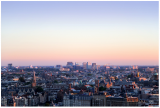
Het lijkt zo vanzelfsprekend, een ritje met de tram of de metro. We steken een druk kruispunt over om toch nog de tram te halen en we lopen wat sneller over de roltrap naar het perron van de metro. Toch is dit voor veel Amsterdammers helemaal niet vanzelfsprekend, bijvoorbeeld wanneer zij een beperking hebben. Deze stadgenoten zijn daarom vaak aangewezen op het doelgroepenvervoer, dit is vaak trager en niet flexibel. Daarom vragen wij ons af; hoe ziet de toekomst van doelgroepenvervoer in Amsterdam eruit? Hoe maken we mobiliteit toegankelijk voor iedereen? Samen met wethouder Sharon Dijksma van Verkeer & Vervoer en vele anderen gaan wij op zoek naar antwoorden.
Met in dit programma onder andere
Karel Martens | Associate Professor at Technion - Israel Institute of Technology Haifa en Radboud Universiteit Nijmegen
Vincent Bijlo | Cabaretier en schrijver
Marc van Gemert | Procesmanager Agenda Autoluw, gemeente Amsterdam
We beginnen de stadsconferentie met een keynotespeech van Karel Martens, als associate professor verbonden aan Technion – Israel Institute of Technology in Haifa en de Radboud Universiteit in Nijmegen, en auteur van het boek ‘Transport Justice, designing fair transportation systems’. Hij zal ingaan op de principes van een rechtvaardig transportsysteem. Daarna spreekt Vincent Bijlo over het belang van de toegankelijkheid van het verkeer voor een inclusieve samenleving.
Verder spreekt Marc van Gemert, procesmanager Autoluw van de gemeente Amsterdam over het belang van een inclusief vervoerssysteem en hoe dit te realiseren.
Verder zijn er pitches van verschillende initiatieven uit Amsterdam en omgeving. Zoals de OV-coach en de tactiele haltekaart.
Voertaal: Nederlands
De Grote Zaal van Pakhuis de Zwijger is rolstoeltoegankelijk en beschikt over een gelijkvloerse toegang tot een roelstoelvriendelijk toilet.
De Mobiele Stad #9: Op een deelfiets moet je het leren
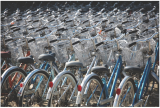
Helpt de terugkeer van de deelfiets tegen stedelijke fietsoverlast?
Met de snelle groei van het aantal Amsterdammers groeit ook het aantal Amsterdamse fietsen. Deze groei gaat niet altijd zonder problemen, de fietspaden worden drukker en fietsparkeren wordt steeds meer een probleem. Helaas gaat dit vaak ten koste van voetgangers, vooral voor rolstoelgebruikers is de stad nog steeds een hindernisbaan. Betaald parkeren is geen optie, want fietsen zijn niet traceerbaar. Om dit probleem aan te pakken, kijkt de gemeente naar het opnieuw toelaten van deelfietsen. Is een beter ingericht deelfietssysteem een oplossing voor de fietsparkeerdrukte? Hoe moet dit dan worden ingericht, en hoe wordt dezelfde ongecontroleerde situatie als in 2017 voorkomen? Samen met zes HvA-studenten en andere gasten gaan wij op zoek naar antwoorden.
Met verder in dit programma onder anderen
Amelie Strens | Manager Service development bij NS Stations
Rocco Piers | Stadsdeelbestuurder Amsterdam Zuid
Micha Mos | Stadsdeelbestuurder Amsterdam Centrum
Rick Vermin | Stadsdeelbestuurder Amsterdam Oost
Erik de Winter | Business developer bij Urbee
Jaron Borensztajn | Mede-oprichter bij Cargoroo
Taraq Hok-Ahin | The Knowledge Mile Amsterdam
Jan-Bert Vroege | Gemeenteraadslid Amsterdam, D66
Studenten aan de Hogeschool van Amsterdam
Max Zoetelief | Student Logistics Management aan de Hogeschool van Amsterdam
Danny Baltus | Student Logistics Management aan de Hogeschool van Amsterdam
Cesanne van der Velde | Student Logistics Management aan de Hogeschool van Amsterdam
Thomas Stuijvenberg | Student Logistics Management aan de Hogeschool van Amsterdam
Damian Lam | Student Logistics Engineering aan de Hogeschool van Amsterdam
Vincent Chin | Student Logistics Engineering aan de Hogeschool van Amsterdam
We beginnen met de presentatie van het onderzoek door de HvA studenten, gepresenteerd door Max Zoetelief. Zij hebben onderzocht hoe de deelfiets, als last-mile-oplossing, bij kan dragen aan het verminderen van de ruimtevraag van deelfietsen.
Aansluitend zullen Erik de Winter van Urbee, Jaron Borensztajn van Cargoroo en Amélie Strens van NS Stations reageren
Daarna zullen de stadsdeelbestuurders uit Zuid, Oost en Centrum Rocco Piers, Rick Vermin en Micha Mos en Raadslid Jan-Bert Vroege reageren op het onderzoek en de voorstellen van de studenten.
Voertaal: Nederlands
How Amsterdam is fast tracking innovation
Jonathan Andrews reports from Amsterdam on how the city government has developed an eco-system for start-up launches with the intention of positioning the city as both accelerator and customer.
Mobility is not about cars but about liveability
After having posted two small essays about mobility, I felt the necessity to go back to the basics of urban development and the liveability of our environment (which happens to be my field of study, once). Whatever mobility solution we are going to create, cost, comfort, ease of use and sustainability will be the ultimate yardsticks.
Stay up to date
Get notified about new updates, opportunities or events that match your interests.
